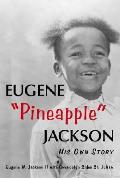Who Could Replace “Sunshine Sammy”?
Ernie “Sunshine Sammy” Morrison was the Hal Roach Studio’s first child star and the highest-paid of the original Our Gang cast. All the more remarkable since Ernie was a black kid in 1920s America.
After a couple of years of those movies being increasingly successful, Ernie’s father asked for a raise. Hal Roach didn’t renew the Morrisons’ contract.
In early 1924, Ernie went off to make more money in vaudeville, though he returned that summer to complete “Fast Company,” a short started the previous year but delayed by the director’s injury.
Roach’s competitors appear to have seen Ernie as a key to the appeal of Our Gang. Many of the rival series that sprang up in this period also featured an African-American boy of the same age.
For example, James Berry played “Bubbles” in some of the Century Kids films—made up in one with white lipstick to look like a minstrel-show caricature. His brother Ananias appeared in the rival McDougall Alley Kids shorts. The Mickey Maguire series featured Jimmy Robinson as “Hambone Johnson,” the hero’s closest friend.
Roach himself recognized Ernie Morrison’s value by trying to replace him. Later in 1924 “The Sun Down Limited” introduced Flemon Miller as “Powder-Puff.” I can’t help but think there was some knowing irony in how that character appeared with the intertitle, “He wanted to join the ‘Gang’—But the quota was exhausted.” Flemon lasted for only one more film, “Every Man for Himself.”
The studio then hired Eugene Jackson from the competing Reg’lar Kids series, at first as “Snowball.” Roach renamed him “Pineapple” after someone combed his hair so it stood up like pineapple leaves—i.e., he was made to look like a joke. Like Ernie Morrison, “Pineapple” was usually older brother to “Farina.” Gene made six shorts from the middle of 1924 to the start of 1925 and went on to a long show-biz career.
After letting Gene Jackson go, the studio’s next Our Gang film was “Official Officers.” Its gang included a black boy played by Todd Roark, who had won a Los Angeles Evening Express Baby Contest with the prize of one week’s work in an Our Gang movie for $100. Todd didn’t stand out, but it’s interesting that the studio brought him on as a gang member, not an incidental extra.
In this same period, George “Sonny Boy” Warde played Sing Joy, a Chinese boy in the gang, over nine shorts. Sonny Boy’s own ancestry was Japanese and French, though there are questions even about that; later he adopted the stage name Luis Cordova before shifting back to Sonny Loy. The point is that the Hal Roach Studio appears to have been trying to present Our Gang as racially inclusive, even while presenting the non-white kids in stereotypical forms.
Meanwhile, every one of those mid-1920s shorts included Allen “Sunny” Hoskins as “Farina,” then four and five years old. In a couple of those movies he was the only black kid. And it turned out he was Ernie Morrison’s replacement all along.
After a couple of years of those movies being increasingly successful, Ernie’s father asked for a raise. Hal Roach didn’t renew the Morrisons’ contract.
In early 1924, Ernie went off to make more money in vaudeville, though he returned that summer to complete “Fast Company,” a short started the previous year but delayed by the director’s injury.
Roach’s competitors appear to have seen Ernie as a key to the appeal of Our Gang. Many of the rival series that sprang up in this period also featured an African-American boy of the same age.
For example, James Berry played “Bubbles” in some of the Century Kids films—made up in one with white lipstick to look like a minstrel-show caricature. His brother Ananias appeared in the rival McDougall Alley Kids shorts. The Mickey Maguire series featured Jimmy Robinson as “Hambone Johnson,” the hero’s closest friend.
Roach himself recognized Ernie Morrison’s value by trying to replace him. Later in 1924 “The Sun Down Limited” introduced Flemon Miller as “Powder-Puff.” I can’t help but think there was some knowing irony in how that character appeared with the intertitle, “He wanted to join the ‘Gang’—But the quota was exhausted.” Flemon lasted for only one more film, “Every Man for Himself.”
The studio then hired Eugene Jackson from the competing Reg’lar Kids series, at first as “Snowball.” Roach renamed him “Pineapple” after someone combed his hair so it stood up like pineapple leaves—i.e., he was made to look like a joke. Like Ernie Morrison, “Pineapple” was usually older brother to “Farina.” Gene made six shorts from the middle of 1924 to the start of 1925 and went on to a long show-biz career.
After letting Gene Jackson go, the studio’s next Our Gang film was “Official Officers.” Its gang included a black boy played by Todd Roark, who had won a Los Angeles Evening Express Baby Contest with the prize of one week’s work in an Our Gang movie for $100. Todd didn’t stand out, but it’s interesting that the studio brought him on as a gang member, not an incidental extra.
In this same period, George “Sonny Boy” Warde played Sing Joy, a Chinese boy in the gang, over nine shorts. Sonny Boy’s own ancestry was Japanese and French, though there are questions even about that; later he adopted the stage name Luis Cordova before shifting back to Sonny Loy. The point is that the Hal Roach Studio appears to have been trying to present Our Gang as racially inclusive, even while presenting the non-white kids in stereotypical forms.
Meanwhile, every one of those mid-1920s shorts included Allen “Sunny” Hoskins as “Farina,” then four and five years old. In a couple of those movies he was the only black kid. And it turned out he was Ernie Morrison’s replacement all along.



No comments:
Post a Comment